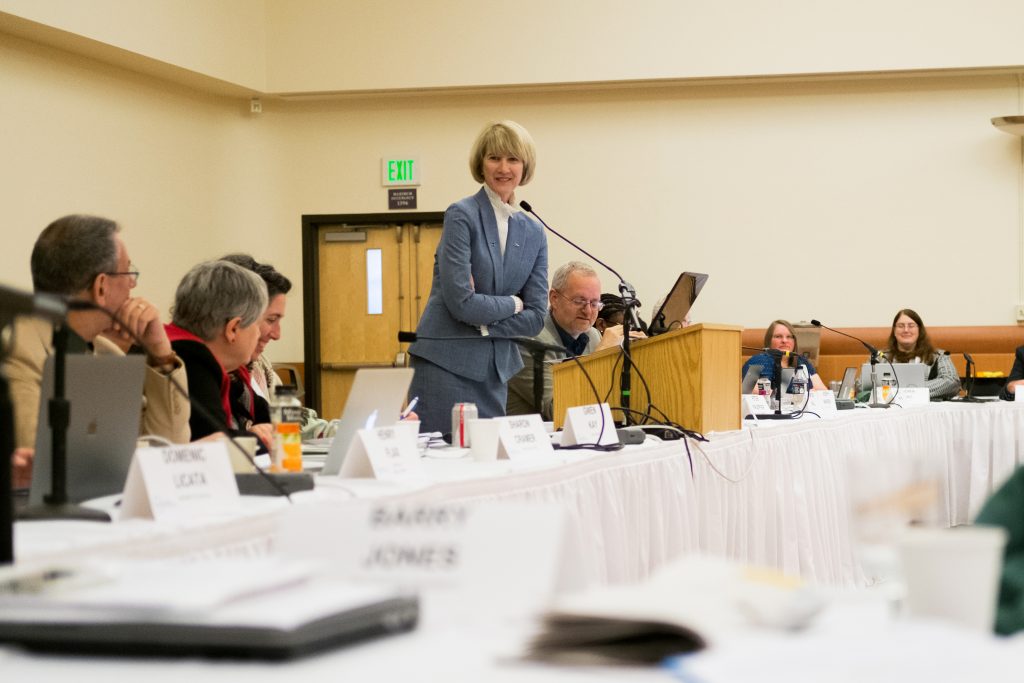Addressing sustainability, diversity and attracting new students in the SUNY system, SUNY Chancellor Kristina Johnson spoke to a panel of about 70 educators at Binghamton University in the Mandela Room on Friday morning.
At the address, which was part of the monthly University Faculty Senate meeting, Johnson discussed multiple concerns within the SUNY system, including attracting new students, strengthening online education and increasing diversity in faculty.
Appointed last April by the SUNY Board of Trustees, Johnson has visited all 64 state-operated SUNY campuses and discussed SUNY’s emphasis on collaboration through systems of shared governance, a model of leadership that includes boards such as the University Faculty Senate, the SUNY Student Assembly and the Faculty Council of Community Colleges.
Johnson said her goals for the SUNY system value are student-centered, keeping a system of shared governance and promoting diversity, collaboration, community engagement, integrity and collegiality.
“We have a vision of high education that enables our students to live in the height of their times,” Johnson said. “My vision involves a broadening of higher education from institutional learning to individualized learning.”
According to Johnson, the overall sustainability of the SUNY system is her top concern and chief goal during her time as chancellor. Johnson said she wants to increase retention rates, reduce unnecessary financial costs and allow for sustainable use of energy at SUNY schools.
“Sustainability is a big deal for me and where my work diverges a bit,” Johnson said. “As chancellor, I have to be responsible for the vibrancy and sustainability of the system. I will make sure we are using our dollars in a way to give a maximum return. I feel very up to the challenge.”
To attract traditional and nontraditional students, Johnson emphasized the importance of SUNY’s online education, which she believes will help attract and retain a more diverse student body, amplifying the system’s impact in New York and across the world.
“Most current online options outside SUNY aren’t affordable or aren’t of high quality,” Johnson said. “We have been shaping our future online for a while and we have taken it to the next level.”
Johnson also addressed the lack of diversity among SUNY faculty, which she said is a serious problem that is driving students away from the system. To fix the issue, Johnson plans to implement the “Prodigy Program,” an initiative in which young faculty members will be hired ahead of the retirements of older professors and lecturers. This will allow employees to retire without compromising diversity and flow of education within the SUNY system.
“It is about more than providing support and a bridge to retirement,” Johnson said. “It is a change about how faculty are recruited.”
She aims to hire at least 100 faculty members a year under the new program. Johnson is also exploring other options to increase diversity at SUNY schools, including programs and grants similar to a new postdoctoral program at BU that helps young faculty who are underrepresented minorities complete postdoctoral research and teach classes before tenure. She said she would like to see the program throughout SUNY.
“The postdoctoral diversity program at Binghamton is another way as well,” Johnson said. “Come on board and do a postdoc and teach and begin your research before the tenure clock starts.”
Maria Helena Lima, an English professor at SUNY Geneseo, attended the talk and said she stands behind Johnson’s stance on increasing faculty diversity.
“I hope to make students as comfortable as possible on campus and seeing faculty that looks like them and respects their ideas is a way towards that goal,” Lima said.



